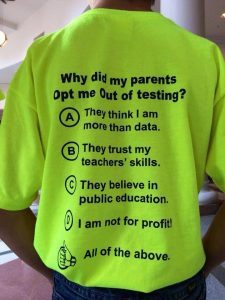Why I Hate Content Marketing or Paid So-Called Journalism
Sometimes you learn something that won't let you go. I read 'Hidden Persuaders' in college, It pissed me off, it scared me and it does even more today. As you read 'News' stories about the blessing of school reform remember that they are selling something.
The Hard Sell
By MARK GREIF
Essay About Vance Packard's 'The Hidden Persuaders' - Books - Review - The New York Times
DEC. 30, 2007
The books a child sneaks off his parents’ bookshelves and surreptitiously reads ought to be sex books. “Lady Chatterley’s Lover” and “Memoirs of Hecate County” scandalized and educated earlier generations. The volume I made off with was a 75-cent paperback of “The Hidden Persuaders” by Vance Packard. It did scandalize me, completely. But it did so by exposing the secret world of advertising and brands. Published in 1957, it is now enjoying its 50th anniversary and a new edition from Ig Publishing, with an introduction by Mark Crispin Miller. I remember my own edition as small enough to hide — not that I really needed to — but packed with dynamite. It had a lurid cover illustration showing a barbed fishhook buried in a gleaming apple. Packard’s book reached into the darkest corners, not of sensuality, which I was sure I knew all about from television, but of the cynical selling in the commercials that ran between the shows.
I was a child of television. Whatever appeared on the color screen of our fake burled wood cabinet TV was a miraculous transmission from a better world. My devotion to television is the only way I can account for the disillusion I suffered at the hands of Packard’s book. Packard had tried to warn Americans of a new mutation in advertising. Powerful admen were working to tap the irrational in the consumer mind, using the applied psychology and sociology supported by the government during World War II. As more goods came to supermarket shelves, advertisers decided they were no longer selling just products, but malleable brand “personalities.” Decades later, I knew the results. Of course Coke was the red wholesomeness of tradition and majority taste, and Pepsi was the younger, blue, less popular choice of a rebellious new generation! My 14-year-old self was sure of it.
Vance Packard had grown up in a different world, in a Methodist farm family in Pennsylvania during the 1920s. Automobiles were still a novelty. Packard’s biographer, Daniel Horowitz, reports a family story about how his dairyman father once tried to stop the family car by shouting “Whoa!” rather than braking and crashed through the wall of his garage. Even after Packard became a sophisticated New York City magazine writer, he simmered at his Madison Avenue colleagues’ manipulation of ordinary folks, people like his childhood neighbors. His muckraking defense of traditional values with up-to-date exposés made him a household name. He had three books on the best-seller lists within four years.
Packard had lived on the cusp of two eras, and what fascinated me as a teenage reader was how close in time he had been to the invention of brands that seemed as solid and permanent to me as trees and stones. Marlboro, the essence of macho, had first been a women’s cigarette, “lipstick red and ivory tipped.” Advertisers managed to push it into a male market while holding on to its previous customers through ad campaigns of “rugged, virile-looking men” (like the famous cowboy) whom, studies proved, women liked too. Packard traced how products like gasoline and detergent, so standardized and reliable in the 1950s, needed to develop “personalities” to survive. I, for one, knew I was a Mobil guy long before I ever got my learner’s permit, though I had no idea why.
The bête noire of “The Hidden Persuaders” was “motivational research.” Rather than focusing on products, this “depth” research dug into the psychological weaknesses and needs of consumers. Packard wanted brands to certify purity or quality, to make an old-fashioned fact-based appeal to citizens who had price and effectiveness in mind. Scientists of motivation, on the other hand, were trying to puzzle out the reasons for impulsive and even self-destructive purchasing, then tailor images and packaging accordingly.
A lot of their research makes sense. People often answer questionnaires by giving idealized pictures of their habits rather than confessing their real weaknesses and needs. How can you know what buyers want unless you probe them more skillfully? Cake-mix makers, for example, had ruined their product by engineering too much for convenience: they told housewives to just add water and turn on the oven. Only after female focus groups revealed the pleasures and responsibilities of cake-making did food makers reformulate their products to require the cook to add eggs and milk, so the activity felt like “baking.”
Polling and focus groups (then called “panel reaction” and “group interviews”) seem part of what we now sometimes consider the democracy of the marketplace — at least for such benign things as recipes. But Packard saw nothing benign when the same techniques were applied to the 1956 presidential election. Presidents would be elected on “personality.” Messages would be short and focus-grouped. Conventions would be choreographed by emissaries from Hollywood. As the 2008 primaries approach, it’s disturbing to see how the novelties Packard deplored have become accepted fundamentals. For 1956, professional advertisers were hired to “swing crucial voters” in “the undecided or listless mass,” trolling for weaknesses in candidates’ images. The “switch voter,” an advertising expert explained after much study, is not a thoughtful “independent” but someone who “switches for some snotty little reason such as not liking the candidate’s wife.” We do pay more overt attention to candidates’ spouses today — not, perhaps, because of more advanced beliefs about marital partnership, but because we’ve all learned to watch the games strategists concoct to reach the “listless mass.” Does that also mean we’ve partly joined it?
In any case, candidates can hardly opt out. “The idea that you can merchandise candidates for high office like breakfast cereal ... is the ultimate indignity to the democratic process,” Adlai Stevenson said of political marketing. He lost.
The weaker parts of Packard’s book are those that overemphasize the sinister power of “depth” rather than the greater power of ubiquity. We’ve since learned that advertisers don’t need depth — not when they can saturate so many advertising spaces and opportunities. Buy enough campaign ads and you can hammer your candidate’s name home. Learn basic consumer desires and you don’t need to re-engineer the subconscious. You just need to send those unspoken desires a huge amount of spam. Spam, like direct mail, billboard advertising and the repetition of names, slogan and logos, became the real future of advertising: overwhelming volume combined with clever placement.
What’s surprising is the degree to which we’ve all become sophisticates, engaging in our own Packard-like critiques of consumer culture without changing our habits. We know we buy irrationally; we just don’t care. We imagine that the “manipulators” at J. Walter Thompson or BBDO play only on the fears and hopes of desperate consumers who aren’t as “conscious” as we are (in which case it’s hard not to admire the ingenuity of the advertisers), while we ourselves are smart enough to decide when to give in. On the last page of “The Hidden Persuaders,” Packard had to acknowledge the paradox: “When irrational acts are committed knowingly they become a sort of delicious luxury.” We seem to enjoy both knowing that ads are hustling us and choosing to be hustled.
This raises the question of whether consumer education and advertising criticism ever help consumers, especially the young. “Media studies” efforts that try to inoculate grade-school kids against Ronald McDonald don’t get much respect. Yet, speaking for myself, the inoculation techniques did make an impact. From the age of 5, I recall more clearly than most things a PBS children’s show’s mock commercial on behalf of water. As if something free to everybody could be sold! (This was before the age of Poland Springs.) Those 90 seconds of TV blew my 5-year-old mind, alerting me that all the other advertisements interrupting my cartoons weren’t out to help me. I could never have put that into words, but then, as the admen know, ads often teach you things you can’t quite say.
Today, we have Naomi Klein’s “No Logo” and Adbusters magazine, but these seem like specially advanced therapies. Whatever its flaws, I’ll keep recommending “The Hidden Persuaders.” For me, it’s the original inoculation against manipulation, and every once in a while — perhaps especially in this political season — one needs to go back for a booster.
Mark Greif is an editor of the magazine n+1.
A version of this article appears in print on , on Page 723 of the New York edition with the headline: The Hard Sell. Today's Paper Essay About Vance Packard's 'The Hidden Persuaders' - Books - Review -
Essay About Vance Packard's 'The Hidden Persuaders' - Books - Review - The New York Times







 Don’t get me wrong – it’s just peachy keen swell that throwing a few computers in the middle of an impoverished village and making sure no teachers interfere practically guarantees a bunch of eight-year olds will master calculus, cure cancer, and reverse climate change. Here’s to the success of every one of those dusty darlings and even newer, bigger opportunities for them to challenge themselves AND the dominant paradigm. Seriously.
Don’t get me wrong – it’s just peachy keen swell that throwing a few computers in the middle of an impoverished village and making sure no teachers interfere practically guarantees a bunch of eight-year olds will master calculus, cure cancer, and reverse climate change. Here’s to the success of every one of those dusty darlings and even newer, bigger opportunities for them to challenge themselves AND the dominant paradigm. Seriously.